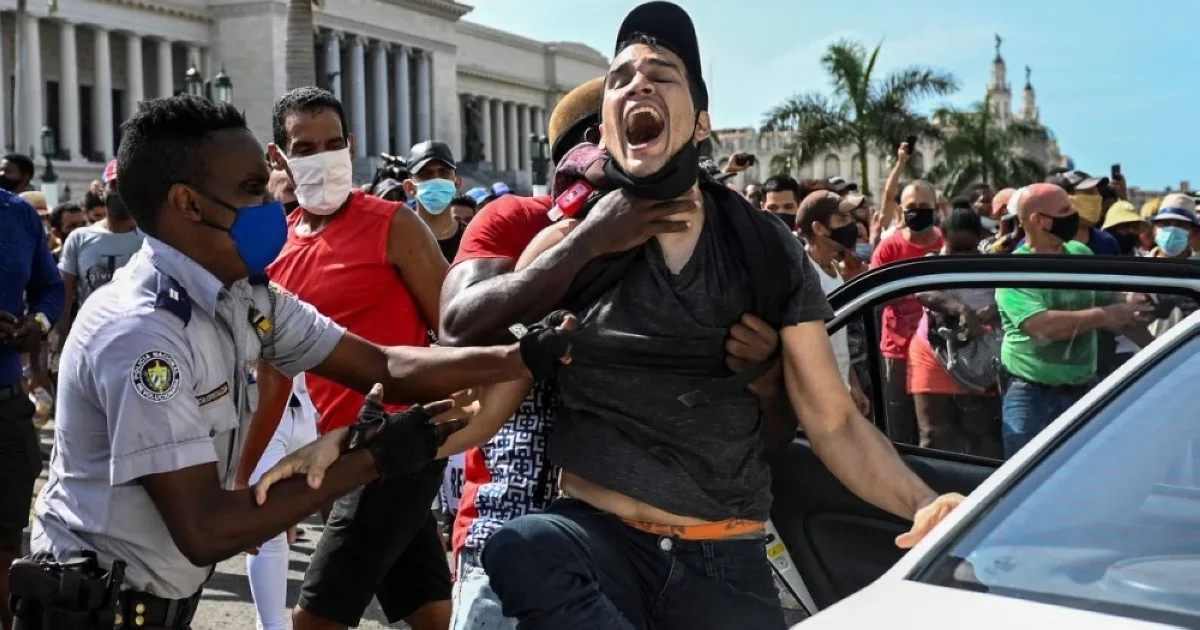HAVANA: Cubans staged rare street protests Sunday over food and electricity shortages as the country suffered long outages that left parts of the island without power for up to 14 hours a day. “People were shouting ‘food and electricity’,” a 65-year-old resident, who asked not to be named, told AFP by phone from the island’s second-largest city of Santiago de Cuba, 800 kilometers (500 miles) east of the capital Havana.
Electricity was restored to the city later in the day and “two truckloads of rice” were delivered, the witness said. Social media platforms were filled with images of protests in Santiago de Cuba, a city of 510,000 people located in the east of the island. There were also images of protests in another large city, Bayamo. Cuba has been experiencing a wave of blackouts since the start of March due to maintenance works on the Antonio Guiteras thermoelectric plant, the island’s largest.
But this weekend, the situation was worsened by a shortage of fuel needed to generate the electricity.
The outages left some areas such as Santiago de Cuba without power for up to 14 hours a day. “Several people have expressed their dissatisfaction with the electricity situation and food distribution,” Cuban President Miguel Diaz-Canel said on X, warning that “enemies of the Revolution” aimed to exploit the situation.
There are “terrorists based in the United States, whom we have denounced on several occasions, who are encouraging actions that go against the internal order of the country,” he added. The US embassy in Havana said on X that it was aware of reports of “peaceful protests” in Santiago, Bayamo and other parts of Cuba. It urged the Cuban government to “respect the human rights of the protestors and address the legitimate needs of the Cuban people.”
Cuban Foreign Minister Bruno Rodriguez responded on X, urging Washington not to “interfere in the country’s internal affairs”. Cuba’s power comes from eight old thermoelectric power plants, generators and eight floating electricity plants leased from Turkey, which were also affected by the fuel shortage.
The cash-strapped island nation imposed a more-than 400 percent fuel price hike earlier this month as part of an economic recovery plan. The nation of 11 million is experiencing its worst economic crisis since the collapse of the Soviet bloc in the 1990s due to fallout from the coronavirus pandemic, the recent tightening of US sanctions and structural weaknesses in the economy. According to official estimates, the Cuban economy shrank by two percent in 2023, while inflation reached 30 percent. Independent experts say this is likely an underestimation. There are chronic shortages of fuel and other basics, and the government subsidizes almost all of the goods and services consumed by Cubans.
Large swathes of Cuba including the capital have been hit by power outages, authorities said, as the country grapples with a dire economic crisis. “Almost the whole country has been affected since yesterday at 11pm (03:00 GMT Saturday), including Havana,” Energy Minister Vicente de la O Levy told state television. “There have been areas in the dark since the early hours of the morning,” and this has lasted “practically all day in almost the whole country,” he added.
Cuba has been experiencing a wave of blackouts since the start of March due to maintenance works on the Antonio Guiteras thermoelectric plant, the island’s largest.
Authorities have promised that the plant, located about 100 kilometers from the capital, will be fully operational again on Sunday. This weekend, the situation was worsened by a shortage of fuel needed to generate the electricity. The cash-strapped island nation imposed a more-than 400 percent fuel price hike earlier this month as part of an economic recovery plan.
De la O Levy said that “the situation will improve” somewhat, but that power supplies “will continue to be strained” due to Cuba’s financial hardships in importing oil.
The nation of 11 million is experiencing its worst economic crisis since the collapse of the Soviet bloc in the 1990s due to fallout from the coronavirus pandemic, the tightening of US sanctions in recent years and structural weaknesses in the economy. According to official estimates, the Cuban economy shrank by two percent in 2023, while inflation reached 30 percent. Independent experts say this is likely an underestimation. There are chronic shortages of fuel and other basics, and the government subsidizes almost all of the goods and services consumed by Cubans. — AFP











